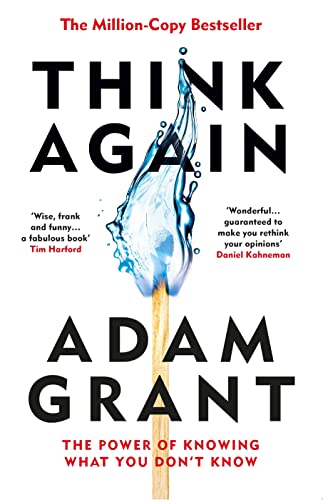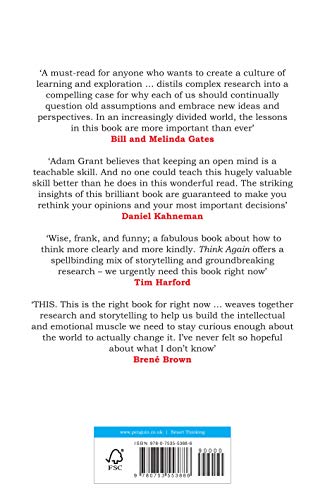


Think Again: The Power of Knowing What You Don't Know
A**D
recommended
Nice book , I learn more
E**S
A must read book
A must read book to learn how to think clearly
@**S
Worth a read
In the book “Think Again” Adam Grant takes us through the process of why, in life we need to think about our brief systems, our confidence in certain subjects and use this in business as well as our social life. If we all thought more deeply, while we might agree to disagree, maybe thinking again would help us understand other people better.Some of you may recall the Space Shuttle Columbia disaster on February 1, 2003, when the Space Shuttle Columbia (OV-102) disintegrated as it reentered the atmosphere, killing all seven crew members. Without going into the some of the detail technical details, some of the tiles on the outside of the shuttle fell off when it took off. But this had happened before and so people thought "so what? they have fallen off before, why does it matter?" In this case the result of the tiles falling off was fatal. Adam also talks about the Dunning–Kruger effect which is a cognitive bias where people will overestimate their ability. Adam goes onto say "If we're certain that we know something, we have no reason to look for gaps and flaws in our knowledge - let alone fill or correct them.”Adam also talks about research where rival American Football teams worked together to try and create a level of co-operation after generations of ingrained rivalry and aggression.Certainly worth a read.
T**K
Different take on a well documented topic
This is a good book. I would have given it a better rating if much in the book had not already been documented by other authors. It covers the topic of critical thinking from the perspective of what we don’t know. Of course we can’t know what we don’t know, but I believe the author is suggesting we need to be aware of that which we don’t know. Inevitably you will come to the same critical thinking awareness that other authors have already arrived at.There are some graphs that I found overly simplistic and a little contrived - but overall helpful.On page 75 (hardcover edition) the author quotes excerpts of Ted Kaczynski’s (the Unabomber) manifesto. The author points out that you may not be “unsettled” if you read the entire document, then adds, “What’s disturbing is the level of conviction”. The author goes on to say, “If he had developed the capacity to discover that he was wrong, would he still have ended up doing something so wrong?”. But was Kaczynski wrong? Not entirely if you remove the level of conviction. There has been consequences from The Industrial Revolution; to some extent it has destabilized society; and it has inflicted greater damage on the natural world. If the author is attempting to arrive at a better truth by questioning what we know we know, then we need to be critical of the use of example so we don’t cherry pick ideas out of context. There is no doubt that Kaczynski was wrong to do what he did, but what he knew was not entirely wrong.Other books I have read on this topic in order of copyright date:On Being Certain, 2008, Robert A. Burton M.D.Being Wrong, 2010, Kathryn SchulzWillful Blindness, 2011, Margaret HeffernanThinking, Fast and Slow, 2011, Daniel KahnemanMistakes Were Made (But Not by Me), 2015, Carol Tavris and Elliot AronsonThe Memory Illusion, 2017, Dr. Julia ShawAs an aside:Quiet (The Power of Introverts In a World That Can’t Stop Talking), 2012, Susan Cain
T**A
IF you are work in progress, Adam’s advice is a good companion!
Think again, is a book that obviously reinforces the importance of rethinking, and highlights the perils of not revisiting one’s ideas and offers advice on methods, tools, and networks that would facilitate rethinking.It also REMINDS me of certain biases, habits, and fallacies that one fall for, if not being made conscious from time to time.Consider the following:1. Do you want your opinions and knowledge to be made right, or wish (hence claim) that they are right?2. Do you wear an advocate and politician or scientist hat when looking at a situation?3. Being competent and being confident are dependent or independent variables? If there is a causal relation, than what is the direction?4. Asking HOW helps reveal to the overconfident, his depth/shallowness of knowledge and need to know more?5. Only the secure identity harness the benefit of doubt, Can you?6. Is your opinion being proven wrong a question about hurt self-identity or joyous occasion of less wrong in future?7. Is the team encountering relationship conflicts or tasks conflict?8. Are you able to keep with the challengers because they care, and weed out insecure criticizers?9. Are your disagreements leading to debate or dispute?10. The more important the matter, do you rely on presenting more arguments in favour of your side, or few important ones, but explained at length?11. To solicit feedback, do u use the rating scale to peg response and seek ways to improve the score?12. Do u assume or ask what kind of evidence will allow others to open their position for a rethink?13. Stereotypes are rarely questioned by giving counter-evidence but often by asking how do you know? And what would it take to verify?14. Do u motivate someone to change or nudge someone to think of their own reason to change?15. Do u base your motivational speech on assumptions, or actually listen through motivational interviewing?16. Attending lectures are enjoyable to experience, but does that translate into effective learning? Would active learning help you get better grades?17. How often do u present material that is open to iteration, refinement, and multiple feedbacks to come to better shape? Do u teach the patience to invite suggestions or embrace criticism?18. How do u marry psychological safety with accountability for results?19. Psychological safe teams make more errors or reveal more errors?20. How can u differentiate perseverance vs stubbornness in your stand?You may be sure of the response to some of them, but in the spirit of think again, do validate with your critiques or take the easy route of checking with Adam!
R**A
Good, if flawed
First, a note on the hardback edition. To put it bluntly: the book (in said edition) is bloated to look bigger, thicker. The font is (unnecessarily) large, the space between the lines is ample, the divisions of chapters too frequent. Etc. It's an edition made so the book looks bigger, perhaps thinking the bigger the book, the better it is. Yet this thinking goes against a maxim in literature: the good, if brief, is twice as good.On the content, no major complains. The books reads well and it is obviously written by an expert and passionate author. Yet it is too diverse, and in the end the point of the whole text gets somehow lost. This is a self-help treaty, a know-yourself better publication and a psichology volume - all in one and never fully settling for one of these fields. It is a good work, but the reader does not find a clear line to follow or fall for.In conclusion: a worthy read of a few interesting (and helpful) ideas, marred by undefinition and, I'm afraid I must insist, an edition that seems to be made to impress the reader.
A**D
One of the most important books ever
This is another brilliant book from Adam Grant.The core message of this book is to think like a scientist. Always seeking new information, challenging existing beliefs including your own, running experiments to test your hypotheses and being a lifelong learner.Adam explains the concepts and then shows us how to apply these rethinking principles to all walks of life. From dealing with prejudices, education, organisational behaviour, listening and questioning, career planning, dealing with conflict and disagreements and avoiding overconfidence. And a few more. As usual Adam combines incredible rigour of studies ( meta analyses ) with practical tips. Most books have a few good chapters and some ordinary ones. But every chapter in this book is worth learning from.Adam discusses a lot of familiar concepts like psychological safety or listening well. There’s nothing new about them. It’s how these concepts reconcile and fit with the scientist and rethink framework which is interesting and nicely explained.At the end of this book you will value humility, self doubt, curiosity, being proven wrong, healthy debate, complexity and nuance and the value of experiments.My favourite line from the book.If knowledge is power, knowing what you don’t know is wisdom.There is a incredible amount of good stuff in this book. I have already started gifting copies.
Trustpilot
1 day ago
2 months ago